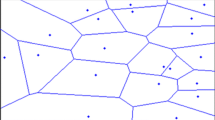Abstract
The parametric effect on performance of Moving Least Squares (MLS) interpolation based recovery technique is evaluated in this paper. The Moving Least Squares (MLS) fitting recovers the field variable derivatives over nodes patch using background element meshes. The recovered errors at element and global levels in the finite element solution are presented in energy norm. The study considers three basic recovery parameters (i.e. parameters affecting the post-processed results) namely shape of influence (support) domain, dilation parameter and order of poly nominal basis function. Numerical experiments on elastic plate problems are carried out for parametric effect of interpolation based post processing technique on effectivity of error estimation and rate of convergence of the recovered solution with fineness of the meshing scheme. The linear and quadratic triangular elements have been used for the discretization of the problem domain. The circular and rectangular shape domain of influence is used to form the node patch. Six different dilation parameters and three different number of basis function terms are selected in the moving least squared interpolation formulation. The study shows that recovery parameters of MLS interpolation method have pronounced effect on the post-processing recovery of finite element solution and optimal alternatives are to be adopted for better performance of the recovery procedures.
Access this chapter
Tax calculation will be finalised at checkout
Purchases are for personal use only
Similar content being viewed by others
References
Ainsworth, M., Oden, J.T.: A posteriori error estimation in finite element analysis. Comp. Methods Appl. Mech. Eng. 142, 1–88 (1997)
Gratsch, T., Bathe, K.: A posteriori error estimation techniques in practical finite element analysis. Comput. Struct. 83, 235–265 (2005)
Mirzaei, D.: Analysis of moving least squares approximation. Revisit. J. Comput. Appl. Math. 282, 237–250 (2015)
Xing, H.L., Wang, S., Makinouchi, A.: An adaptive mesh h-refinement algorithm for finite-element modelling of sheet forming. J. Mater. Process. Technol. 91, 183–190 (1999)
Liu, Y.C., Elmaraghy, H.A.: Assessment of discretized errors and adaptive refinement with quadrilateral finite element. Int. J. Num. Methods Eng. 33, 781–798 (1992)
Zienkiewicz, O.C., Zhu, J.Z.: A simple error estimator and adaptive procedure for practical engineering analysis. Int. J. Num. Methods Eng. 24, 333–357 (1987)
Liu, G.R., Nguyen-Thoia, T., Lam, K.Y.: A novel alpha finite element method (αFEM) for exact solution to mechanics problems using triangular and tetrahedral elements. Comput. Methods Appl. Mech. Eng. 197, 3883–3897 (2008)
Kim, K.-Y., Lee, H.-C.: A posteriori error estimators for nonconforming finite element methods of the linear elasticity problem. J. Comput. Appl. Math. 235, 186–202 (2010)
Ullah, Z., Coombs, W.M., Augarde, C.E.: An adaptive finite element/meshless coupled method based on local maximum entropy shape functions for linear and nonlinear problems. Comput. Methods Appl. Mech. Eng. 267, 111–132 (2013)
Bramble, J.H., Schatz, A.H.: Higher order local accuracy by averaging in finite element method. 31, 94–111 (1977)
Hinton, E., Campbell, J.S.: Local and global smoothing of discontinuous finite element functions using a least square methods. Int. J. Num. Methods Eng. 8, 61–80 (1974)
Zienkiewicz, O.C., Zhu, J.Z.: The superconvergent patch recovery and a posteriori error estimates, part I, the error recovery technique. Int. J. Num. Methods Eng. 33, 1331–1364 (1992)
Zienkiewicz, O.C., Zhu, J.Z.: The superconvergent patch recovery and a posteriori error estimates. Part II: error estimates and adaptivity. Int. J. Num. Methods Eng. 33, 1365–1382 (1992)
Li, X.D., Wiberg, N.E.: An posteriori error estimate by element patch post-processing, adaptive analysis in energy and L2 norms. Comput. Struct. 53, 907–919 (1994)
Ubertini, F.: Patch recovery based on complementary energy. Int. J. Numer. Methods Eng. 59(11), 1501–1538 (2004)
Parret-Fréaud, A., Rey, V., Gosselet, P., Rey, C.: Improved recovery of admissible stress in domain decomposition methods—application to heterogeneous structures and new error bounds for FETI-DP. Int. J. Numer. Methods Eng. 111(1), 69–87 (2016)
Sharma, R., Zhang, J., Langelaar, M., van Keulen, F., Aragón, A.M.: An improved stress recovery technique for low-order 3D finite elements. Int. J. Numer. Methods Eng. 114, 88–103 (2018)
Ahmed, M., Singh, D., Desmukh, M.N.: Interpolation type stress recovery technique based error estimator for elasticity problems. Mechanika 24(5), 672–679 (2018)
Rajendran, S., Liew, K.M.: Optimal stress sampling points of plane triangular elements for patch recovery of nodal stresses. Int. J. Numer. Methods Eng. 58, 579–607 (2003)
Wang, J.G., Liu, G.R.: On the optimal shape parameters of radial basis functions used for 2-D meshless methods. Comput. Methods Appl. Mech. Eng., 191(23–24), 2611–2630 (2002)
Kanber, B., Bozkurt, O.Y., Erklig, A.: Investigation of RPIM shape parameter effects on the solution accuracy of 2D elastoplastic problems. Int. J. Comput. Methods Eng. Sci. Mech. 14, 354–366 (2013)
Perko, J., Šarler, B.: Weight function shape parameter optimization in meshless methods for non-uniform grids. CMES 19(1), 55–68 (2007)
Nie, Y.F., Atluri, S.N., Zuo, C.W.: The optimal radius of the support of radial weights used in moving least squares approximation. CMES 12(2), 137–147 (2006)
Onate, E., Perazzo, F., Miquel, J.: A finite point method for elasticity problems. Comput. Struct. 79, 2151–2163 (2001)
Ahmed, M., Singh, D.: An adaptive parametric study on mesh refinement during adaptive finite element simulation of sheet forming operations. Turk. J. Eng. Environ. Sci. 13, 1–13 (2008)
Acknowledgements
Authors thank Deanship of Research, Ministry of Higher Education, KSA, for financial support to carry out the research work. The authors also acknowledge to the Dean, College of Engineering for his valuable support and help.
Author information
Authors and Affiliations
Corresponding author
Editor information
Editors and Affiliations
Rights and permissions
Copyright information
© 2020 Springer Nature Switzerland AG
About this paper
Cite this paper
Ahmed, M., El Ouni, M.H., Singh, D., Kahla, N.B. (2020). Moving Least Squares (MLS) Interpolation Based Post-processing Parametric Study in Finite Element Elastic Problems. In: Okada, H., Atluri, S. (eds) Computational and Experimental Simulations in Engineering. ICCES 2019. Mechanisms and Machine Science, vol 75. Springer, Cham. https://doi.org/10.1007/978-3-030-27053-7_105
Download citation
DOI: https://doi.org/10.1007/978-3-030-27053-7_105
Published:
Publisher Name: Springer, Cham
Print ISBN: 978-3-030-27052-0
Online ISBN: 978-3-030-27053-7
eBook Packages: EngineeringEngineering (R0)




